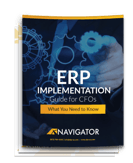
Why CFOs Should Be Leading ERP Adoption
The decisions made by a company’s chief financial officer are “the foundations of the pyramid that determine whether the organization succeeds or fails,” according to the Boston Consulting Group. These choices leave a long-lasting mark on the company that reverberates through many departments and over many years.
CFOs must help shape the company’s agenda, engage with investors and capital markets, ensure strong financial performance, and partner with business colleagues to support operations. At the same time, they must still carry through with traditional tasks and oversee the finance function’s core audit, regulatory, and risk-management responsibilities.
Transforming their company into a digital enterprise is one way a CFO can achieve at least some of these ambitious goals, and that often comes from helping a firm adopt or modernize its enterprise resource planning system (ERP). ERP is one of the key enablers of digital transformation.

Get the ERP Implementation Guide for CFOs
Let’s take a closer look at why a CFO should take the lead in a company’s ERP project.
1. Brings Complete Visibility to Support Decision-making
A CFO should be an agent of change who questions the status quo and brings in new ideas. However, translating these ideas into tangible results and realistic execution plans requires visibility into overall business operations.
An ERP platform is organization-wide business software that handles all aspects of a company’s operations, from accounting and human resources to manufacturing and distribution. ERP tracks, standardizes, and brings visibility to every aspect of the business, which can help CFOs adjust corporate priorities, lead change management, and improve business processes and the culture for better financial performance and cost optimization.
ERP—and cloud ERP in particular—brings real-time, unified financial data to the company and increased accounting transparency across the organization. This can facilitate faster sales closures, lower transaction costs, and working capital optimization, and can also ensure that compliance needs are met nationally and globally.
2. Drives Digital Transformation
Since the coronavirus pandemic swept across the globe, companies have needed to accelerate their digital transformation in order to survive amidst the digital disruption and economic turmoil. Having an ERP system in place helps a firm drive digital transformation and stay competitive.
ERP creates a unified and integrated database that provides a single view of the organization and delivers real-time information to decision-makers. By embracing data analytic tools, machine learning, dashboards, and embedded analytics, an organization’s leaders can always know their business’s current financial and operational performance. Intelligent automation goes a step further and helps businesses automatically optimize financial decisions in real-time.
Deploying analytics can speed along a digital transformation plan and support the company’s strategies. Enabling precise measurement abilities further helps deliver tangible results. Information presented in an all-digital format helps top management achieve a holistic view of the entire organization.
3. Improves Revenue Opportunities
ERP helps businesses expand revenue opportunities by supporting growth and profitability in new markets and geographies. ERP empowers management accounting simulations with what-if analysis combined with real-time financial information for better decision making.
Flexible system processes and easy configuration boost agility and help companies meet evolving business needs and find new opportunities. A single repository for all accounting information also improves reporting consistency and reliability for legal and management reporting.
ERP helps to link processes across the entire value chain—including those in manufacturing, procurement, sales, and services. This enables automatic updates to the general ledger and subledgers for greater insight.
4. Automates Financial Processes
Running highly efficient and automated financial processes with ERP gives a company a platform for improved financial management. ERP helps record transactions that are reflected automatically across all ledgers for faster management and a single source of truth that includes all financial data.
Process automation helps define closing tasks and their sequence in advance to minimize the risk of data omission or the mistiming of important closing steps.
The automatic generation of a transparent audit trail helps to automate financial value chain operations such as payment reminders, payment advice, electronic bank transfers, and statements.
5. Optimizes Cashflow and Financial Structures
With ERP, businesses gain an unprecedented level of visibility into their own operations for better financial optimization at every level of the company. Tasks in payments and collections can be sent automatically to accountants for acceptance or manual resolution for more efficient financial oversight.
Streamlined collections improve transparency into who owes money to the company, the exact amounts involved, and the length of time the debts have been outstanding. This helps achieve shorter days-sales-outstanding and reduces operating cash cycles.
Central management and real-time access to all bank-related information and accounts make it easy to conduct liquidity forecasts, manage cash, and optimize cash positions. Greater visibility into financial performance helps shorten cash cycles and improve the cash-to-cash cycle.
ERP isn’t an IT project—It’s a Financial Management Project
Many executives treat ERP as yet another IT project, but that’s a fundamental misunderstanding. In truth, rolling out an ERP system is a financial management project at its core.
A proven ERP system helps improve the way a business manages its financial position. The rollout of an ERP system requires hands-on CFO input and guidance. IT handles the technical details, but ultimately this is all about managing and improving the financial performance of the company.
The CFO of the future needs to build credibility to support an organization’s existing growth efforts. The CFO is well-positioned to add value in organization-wide transformation initiatives, because the finance function is spread across, and interacts with, the entire organization. This is about business impact, not just finance expertise.
To learn more about the ERP journey, check out “Understanding Cloud ERP for Non-IT Executives,” a free guide from Navigator.

